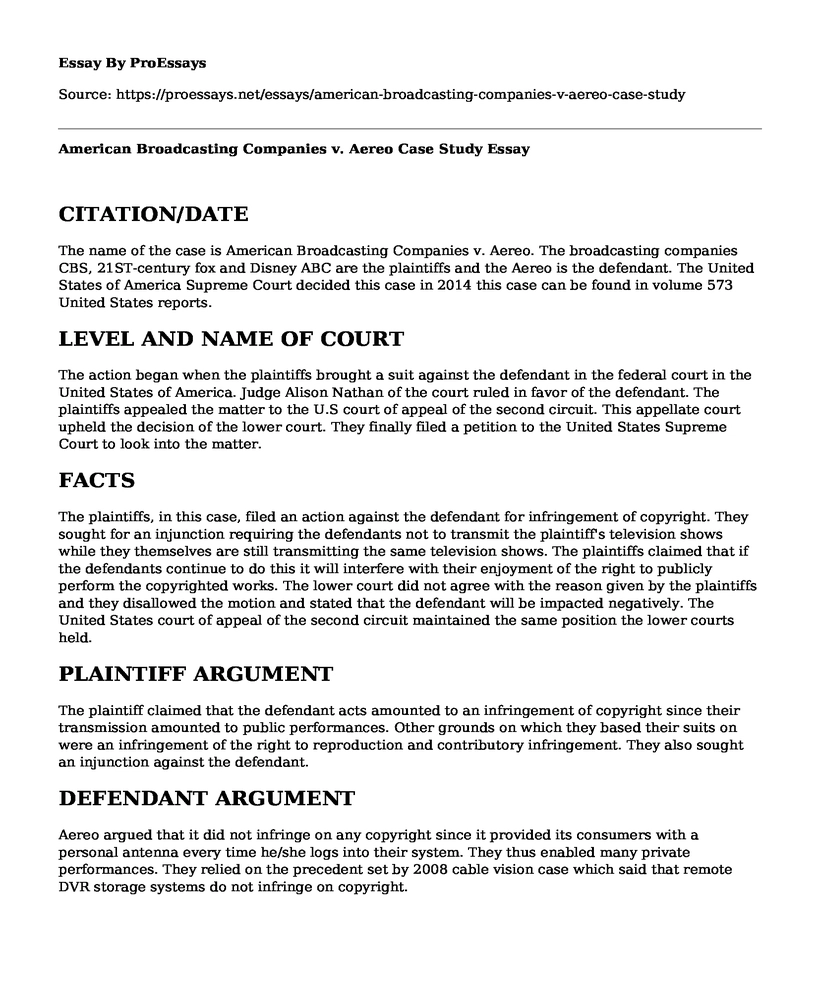CITATION/DATE
The name of the case is American Broadcasting Companies v. Aereo. The broadcasting companies CBS, 21ST-century fox and Disney ABC are the plaintiffs and the Aereo is the defendant. The United States of America Supreme Court decided this case in 2014 this case can be found in volume 573 United States reports.
LEVEL AND NAME OF COURT
The action began when the plaintiffs brought a suit against the defendant in the federal court in the United States of America. Judge Alison Nathan of the court ruled in favor of the defendant. The plaintiffs appealed the matter to the U.S court of appeal of the second circuit. This appellate court upheld the decision of the lower court. They finally filed a petition to the United States Supreme Court to look into the matter.
FACTS
The plaintiffs, in this case, filed an action against the defendant for infringement of copyright. They sought for an injunction requiring the defendants not to transmit the plaintiff's television shows while they themselves are still transmitting the same television shows. The plaintiffs claimed that if the defendants continue to do this it will interfere with their enjoyment of the right to publicly perform the copyrighted works. The lower court did not agree with the reason given by the plaintiffs and they disallowed the motion and stated that the defendant will be impacted negatively. The United States court of appeal of the second circuit maintained the same position the lower courts held.
PLAINTIFF ARGUMENT
The plaintiff claimed that the defendant acts amounted to an infringement of copyright since their transmission amounted to public performances. Other grounds on which they based their suits on were an infringement of the right to reproduction and contributory infringement. They also sought an injunction against the defendant.
DEFENDANT ARGUMENT
Aereo argued that it did not infringe on any copyright since it provided its consumers with a personal antenna every time he/she logs into their system. They thus enabled many private performances. They relied on the precedent set by 2008 cable vision case which said that remote DVR storage systems do not infringe on copyright.
COURT'S DECISION AND REASONING
The question the court was faced with is whether a company transmitting television shows over the internet constitutes to be publicly performed? The decision of the court was 6-3 to the majority. The court was of the opinion that the defendant had not infringed on the copyright of the plaintiffs. Justice Stephen G. delivered the opinion of the majority. He said since the defendant is functionally related to community antenna television the copyright act regulates its activities. From the copyright act, we see the defendant transmission of broadcast television shows created on request of their users and transmitted to him as the show is still airing on the broadcast television does not amount to the public performance of the American broadcasting companies' copyrighted work under cable vision. Thus the defendants like community antenna television do not just provide equipment but are themselves broadcasters.
DISSENT
Justice Antonin Scalia wrote a dissenting opinion. She stated that the defendant only provided a mechanism/ platform for the consumer to use as he sees fit. This is because the defendant does not involve himself in the selection of content and thus they cannot be the one to be liable for their customer's choice of transmission content. She was of the view that the decision by the majority was based on the wrong assumption that the defendant's function resembles that of community antenna television which creates a broad rule that makes it be regarded as useless. She stated that volitional conduct was the best method to be used in the bright line test
PRECEDENT/POINT OF LAW/RULE OF LAW
In the famous case between Cartoon Network and CSC Holdings provided a precedent in this case. The defendants had claimed that the plaintiff DVR system infringed on the right of the defendant to reproduction and that of public performance. The court held that the plaintiff's act does not infringe upon the defendants' rights.
Works Cited
Corvo, Tara M, and Howard J Symons. Broadband and Cable Industry Law, 2013. New York, NY: Practicing Law Institute, 2013. Print.
Schultz, Jason. "Brief Of Amici Curiae Small And Independent Broadcasters In American Broadcast Companies, Inc. V. Aereo, Inc., and No. 13- 461." SSRN Electronic Journal (2014): n. page. Web.
Cite this page
American Broadcasting Companies v. Aereo Case Study. (2022, May 17). Retrieved from https://proessays.net/essays/american-broadcasting-companies-v-aereo-case-study
If you are the original author of this essay and no longer wish to have it published on the ProEssays website, please click below to request its removal:
- Do Background Checks Actually Work to Deter Crime? - Essay Sample
- How Do the Agencies of the Criminal Justice System Work Together to Provide Justice?
- How Social Movement, Women's Movement, and the Civil Rights Movement Affect Democracy
- The Modern Biosocial Perspectives of Criminal Behavior Essay
- The Juvenile Justice and Delinquency Prevention Act: Protecting Youth from Risk in Adult Detentions
- LGBT Rights: A Fight for Equality and Dignity - Essay Sample
- Essay Example on CDA 1998: Reforming UK's Failing Youth Justice System







